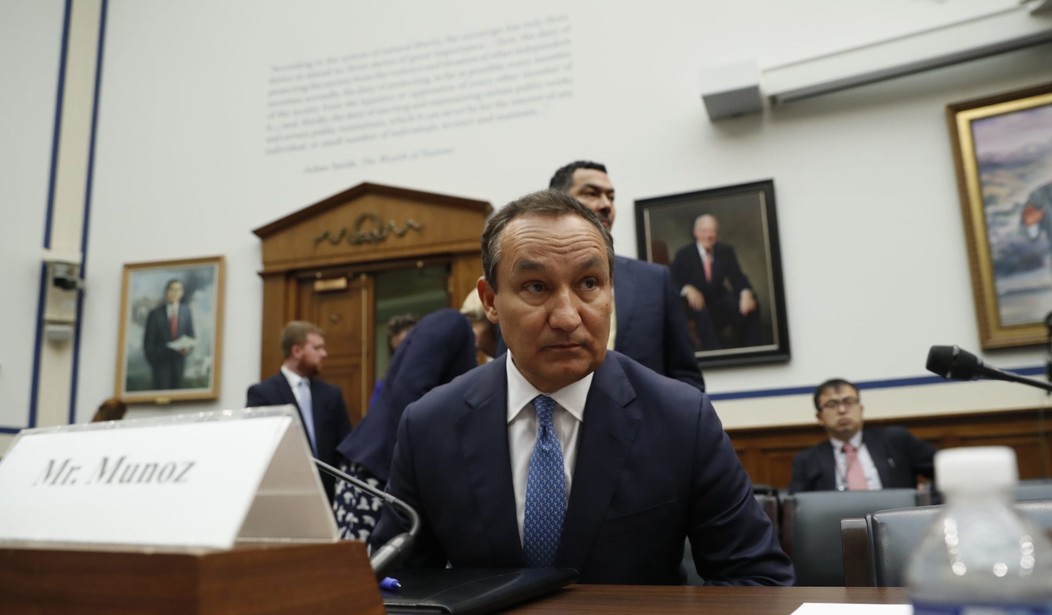WASHINGTON — The CEO of United Airlines faced an angry House Transportation Committee this morning, apologizing to the world for Dr. David Dao being forcibly removed and beaten up on an April 9 flight so that a United flight crew could board a booked flight.
“Further, I’m personally sorry for the fact that my immediate response and the response of our airline was inadequate to that moment. No customer, no individual, should ever be treated the way Mr. Dao was, ever, and we understand that,” Oscar Munoz told lawmakers, adding an internal report revealed “four main failures” that led to the viral incident.
First, he said, law enforcement was called to remove Dao off the plane when the passenger refused, but a security issue “did not exist” and airline staff shouldn’t have called the cops.
“Second, we re-booked crew at the very last minute. We created a situation at our undoing that we should never done. And third, we didn’t offer enough compensation or not incentivized or any options for those customers to give up a seat,” Munoz continued.
“And therefore, in perhaps the largest failure, our employees did not have the authority to do what was right or to use, frankly, their common sense — as some of you outlined — and in that moment, for our customers and our company, we failed.”
The CEO vowed that “unless safety or security are an issue, we will never again ask a customer to give up their seat once they’re on board.” And volunteers to leave an overbooked flight will be offered up to $10,000 because “common sense says that you can’t stop at a number.” Apart from the Dao incident, he added, the airline is instituting a “no-questions asked $1500 reimbursement for permanently lost luggage.”
With the panel rounded out by United Airlines president Scott Kirby, American Airlines senior VP Kerry Philipovitch, Alaska Airlines senior VP Joseph Sprague, Southwest Airlines executive VP Bob Jordan, and consumer advocate William McGee, it was also a forum for lawmakers who regularly fly to and from their districts to kvetch about their own airline experiences.
McGee said that while major airlines “may boast of investing millions into their operations,” a “closer examination reveals those investments often focus on amenities and perks for the few who can afford to pay more to fly in premium classes while the overwhelming bulk of passengers in economy are subjected to packed cabins, tight seats, new and higher add-on fees and all too often an utter lack of respect.”
“One, no-show passengers today are penalized either with high fees or the forfeiture of their tickets. Two, state-of-the-art yield management systems allow airlines to closely manage selling all available seats. Three, the demise of once ubiquitous interline agreements that allowed bumped passengers to be accommodated on rival carriers. And four, record-high passenger loads historically in the 50 to 60 percentile range now average in the low 80s and regularly reach 100 percent,” he said.
“We are not aware of other industries in America where the business is given this kind of free license to oversell the product with so little accountability for failing to deliver.”
Kirby said United views overbooking “particularly in situations where we can incentivize a customer to take an alternative flight as a win-win for both the airline and for those customers.”
“And 96 percent of the situations where we have overbooking, we’re able to get the customers to be volunteers and in today’s world where we’ve increased the compensation limit to 10,000, we’re hoping to drive that down to, essentially, zero,” the airline president added. “So we view overbooking as something that actually helps us accommodate and take care of thousands more customers than we would otherwise be able to.”
Munoz admitted that “there have been a good amount of occasions” in which the airline called law enforcement to remove passengers from an overbooked plane. “It happened without incident.”
Rep. Rick Crawford (R-Ark.) noted that the airline execs looked “uncomfortable and the body language was evident this is not a topic anybody wants to talk about” when another committee member brought up the relationship between overbooking and change fees.
Kirby said change fees are “mostly about our way of offering low fares to consumers.”
“Fares have declined 24 percent since — in the last 20 years, in real terms. One of the great things about deregulation and about these kinds of policies overbooking and change fees is that we’ve driven prices lower for consumers and there’s more people traveling in the United States than anywhere in the world,” the United president said.
Rep. Eddie Bernice Johnson (D-Texas) noted that the Department of Transportation received 12,766 consumer complaints against U.S. airlines last year.
“What were the rules in place to determine who would be removed from the plane?” she asked.
Munoz replied it was “a simple automatic process that dealt with — without all the complexity — what someone paid and whether they were enrolled in our mileage-plus program.”
Dao, he confirmed, “was one of the lower fares.”









Join the conversation as a VIP Member